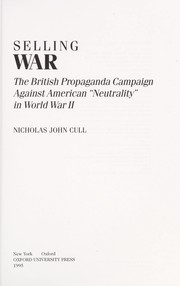- Summary
- "British propaganda brought America to the brink of war, and left it to the Japanese and Hitler to finish the job." So concludes Nicholas Cull in this absorbing study of how the United States was transformed from isolation to belligerence in the years before the attack on Pearl Harbor. From the moment it realized that all was lost without American aid, the British Government employed a host of persuasive tactics to draw the U.S. to its rescue. With the help of talents as varied as those of matinee idol Leslie Howard, Oxford philosopher Isaiah Berlin and society photographer Cecil Beaton, no section of America remained untouched and no methodfrom Secret Service intrigue to the publication of horrifying pictures of Nazi atrocities - remained untried. The British sought and won the support of key journalists and broadcasters, including Edward R. Murrow, Dorothy Thompson, and Walter Winchell: Hollywood film makers also played a willing part. Cull details these and other propaganda activities, covering the entire range of the British effort. A fascinating story of how a foreign country promoted America's involvement in its greatest war, Selling War will appeal to all those interested in the modern cultural and political history of Britain and the United States.
- Format
- Book
- Author/Creator
- Cull, Nicholas John.
- Published
- New York : Oxford University Press, 1995
- Locale
- United States
- Contents
-
1. The Gathering Storm: Britain's American Propaganda Policy, 1937 to 1939. Britain's Dilemma: Britain in American Opinion, 1919 to 1937. Foundations: British Propaganda in the United States, 1919 to 1937. The Awakening: British Planning, 1937 to 1938. Preparing for the Worst: Britain's American Propaganda Policy, September 1938 to September 1939
2. To War with Words: British Propaganda in the United States during the Phoney War, September 1939 to May 1940. The United States and the Phoney War. Fighting the Phoney War in London: The MoI and the BBC. Fighting the Phoney War in the United States: The British Embassy and the British Library of Information. The Development of American Opinion and British Policy
3. Their Finest Hour: Projecting the Battle of Britain, May to September 1940. American Opinion in the Summer of 1940. Lord Lothian's War: New Initiatives, May to August 1940. Duff Cooper's War: New Initiatives in London, May to August 1940. The Battle of Britain and the Destroyer Deal
4. "London Can Take It": British Propaganda and the Blitz, September to December 1940. The Overture: Preparing for the Blitz. "This Is London": The Co-projection of the Blitz on Britain. The Impact of the Blitz: American Sympathy and Its Limits. Beyond the Blitz: Building New Propaganda Machinery in the United States
5. "Give Us the Tools . . .": British Propaganda and American Aid, January to August 1941. New York: Winning the War from Rockefeller Center. London: British Broadcasting and Film, and the Greek Intervention. Washington: Friends, Enemies, and the Supply Crisis. London: The Battle of Bloomsbury
6. War Comes To America: The Road to Pearl Harbor, August to December 1941. The Orchestra of Propaganda: Britain's Overt Campaign in the Autumn of 1941. British Covert Propaganda in the Autumn of 1941. Victory: The United States' Culture of Belligerence. The Reckoning: Pearl Harbor
Epilogue: British Propaganda in the United States after 1941
Conclusion: British Propaganda and the Making of American Foreign Policy, 1939 to 1941.
- Notes
-
Includes bibliographical references (pages 245-261) and index.
1. The Gathering Storm: Britain's American Propaganda Policy, 1937 to 1939. Britain's Dilemma: Britain in American Opinion, 1919 to 1937. Foundations: British Propaganda in the United States, 1919 to 1937. The Awakening: British Planning, 1937 to 1938. Preparing for the Worst: Britain's American Propaganda Policy, September 1938 to September 1939 -- 2. To War with Words: British Propaganda in the United States during the Phoney War, September 1939 to May 1940. The United States and the Phoney War. Fighting the Phoney War in London: The MoI and the BBC. Fighting the Phoney War in the United States: The British Embassy and the British Library of Information. The Development of American Opinion and British Policy -- 3. Their Finest Hour: Projecting the Battle of Britain, May to September 1940. American Opinion in the Summer of 1940. Lord Lothian's War: New Initiatives, May to August 1940. Duff Cooper's War: New Initiatives in London, May to August 1940. The Battle of Britain and the Destroyer Deal -- 4. "London Can Take It": British Propaganda and the Blitz, September to December 1940. The Overture: Preparing for the Blitz. "This Is London": The Co-projection of the Blitz on Britain. The Impact of the Blitz: American Sympathy and Its Limits. Beyond the Blitz: Building New Propaganda Machinery in the United States -- 5. "Give Us the Tools . . .": British Propaganda and American Aid, January to August 1941. New York: Winning the War from Rockefeller Center. London: British Broadcasting and Film, and the Greek Intervention. Washington: Friends, Enemies, and the Supply Crisis. London: The Battle of Bloomsbury -- 6. War Comes To America: The Road to Pearl Harbor, August to December 1941. The Orchestra of Propaganda: Britain's Overt Campaign in the Autumn of 1941. British Covert Propaganda in the Autumn of 1941. Victory: The United States' Culture of Belligerence. The Reckoning: Pearl Harbor -- Epilogue: British Propaganda in the United States after 1941 -- Conclusion: British Propaganda and the Making of American Foreign Policy, 1939 to 1941.




